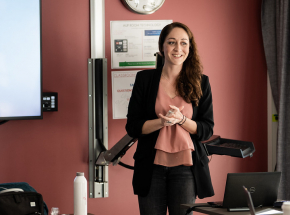- About AUP
- History of AUP
- Mission & Core Values
- Vision and Leadership
- AUP Recognition
- Alumni Success
- Campus Development
- Arts at AUP
- Policies & Guidelines
- Academics
- Undergraduate
- Graduate Programs
- MA in Diplomacy and International Law
- MA in Global Communications
- MSc in Human Rights and Data Science
- MA in International Affairs
- MA in International Affairs, Conflict Resolution, and Civil Society Development
- MSc in International Management
- MSc in Strategic Brand Management
- Find Your Thesis Advisor
- Previous Programs
- Cultural Program
- Faculty
- Summer School
- Research Centers
- The Center for Critical Democracy Studies
- The Center for Writers and Translators
- The George and Irina Schaeffer Center for the Study of Genocide, Human Rights and Conflict Prevention
- The Joy and Edward Frieman Environmental Science Center
- The Center for Media, Communication & Global Change
- Departments
- Academic Resources
- Academic Affairs
- Academic Calendar
- Academic Resource Center
- Library
- Registrar's Office
- Teaching and Learning Center
- Employer Network
- Accessibility & Accommodation Services
- Quai D'Orsay Learning Commons
- Paris as Classroom
- ACE Center
- Admissions
- Student Life
- Campus
- Get Involved
- Paris
- Support Services
- Student Development Help Desk
- Student Accounting Services
- Student Immigration Services
- Student Grievance Procedure
- Accessibility at AUP
- Diversity and Inclusion
- Health & Well-being
- Digital Student Handbook
- News
- Events
- AUP Giving
- Housing Offer for 2024-2025
- Housing | Spring 2024
- IRIS Project
- IT Services
- Alumni
- About AUP
- History of AUP
- Mission & Core Values
- Vision and Leadership
- AUP Recognition
- Alumni Success
- Campus Development
- Arts at AUP
- Policies & Guidelines
- Academics
- Undergraduate
- Graduate Programs
- MA in Diplomacy and International Law
- MA in Global Communications
- MSc in Human Rights and Data Science
- MA in International Affairs
- MA in International Affairs, Conflict Resolution, and Civil Society Development
- MSc in International Management
- MSc in Strategic Brand Management
- Find Your Thesis Advisor
- Previous Programs
- Cultural Program
- Faculty
- Summer School
- Research Centers
- The Center for Critical Democracy Studies
- The Center for Writers and Translators
- The George and Irina Schaeffer Center for the Study of Genocide, Human Rights and Conflict Prevention
- The Joy and Edward Frieman Environmental Science Center
- The Center for Media, Communication & Global Change
- Departments
- Academic Resources
- Academic Affairs
- Academic Calendar
- Academic Resource Center
- Library
- Registrar's Office
- Teaching and Learning Center
- Employer Network
- Accessibility & Accommodation Services
- Quai D'Orsay Learning Commons
- Paris as Classroom
- ACE Center
- Admissions
- Student Life
- Campus
- Get Involved
- Paris
- Support Services
- Health & Well-being
- Digital Student Handbook
- News
- Events
- AUP Giving
- Housing Offer for 2024-2025
- Housing | Spring 2024
- IRIS Project
- IT Services
- Alumni
Student
How did you come about doing the HRDS program?
I have a very technical, product-driven background, but I wanted to also understand the legal side of things to help me articulate some of the concerns I had surrounding data use. I contemplated going to law school, but I was worried I would lose my technical skills studying straight law for four years. After a lot of Googling, I came across the HRDS program. It’s the only program of its kind in the whole world. Professors Roda and Perry have created a wonderful niche: one that deserves to be much more widespread.
What first got you interested in combining data and law?
When I first became a youth ambassador for my Native American nation, I was in junior high. The platform gave me a lot of people’s ears, so I started talking about technology and data as it kept people’s attention. I turned it into my academic and professional career. The summer before the HRDS program, I did another program with the United Nations. People tend to assume that if you work with data, you work with products, but before a piece of code is ever written, there’s all this research and analysis that goes on first. That drives what we decide to build, design and develop.
You won the 2023 IAPP Westin Scholar Award for data protection and privacy...
I was recognized for my research exploring the impacts of standardization efforts on privacy in high-impact technologies, the privacy implications of virtual reality, and the privacy concerns surrounding technology use in humanitarian action. The IAPP is an international association of privacy professionals, so an award like this goes right alongside my international degree. I am honored to work in a career where promoting privacy and data protection is both necessary and highly valued. It is essential to have comprehensive data collection practices that respect individual privacy and do not put vulnerable communities at risk.
You also presented some of your work at an academic conference...
Yes, last spring – at the Challenging Borders Conference held at Albion College, Michigan. The work came out of a data science project in my first semester involving mapping. It centered on cases of missing or murdered Indigenous women, girls and people (MMIWG/P) in the United States. Violence against American Indian and Alaska Native women and girls is a crisis in the US, with cases of missing or murdered Indigenous women still occurring nationwide. Although there are several thousand reported cases, official government databases log approximately two percent of these cases.
What did the research involve?
I used sentiment analysis tools to look at social media posts in areas with a high concentration of MMIWG/P cases. The research aimed to understand how information is shared, the content and context of messages, and the patterns of reported missing persons. The study found a lack of comprehensive data and highlighted the limitations of sentiment analysis, which may not accurately reflect the experiences of marginalized communities. I want to better understand what technology is missing, who it has overlooked, and how data will continue to impact society moving forward.
Related
-

Professor Roda
Faculty
Read MoreProfessor Roda
Faculty
“By looking at both ethical and technical questions surrounding data science, our graduates will be able to take a proactive stand in the multistakeholder...
-

Dominic Spada
Student
Read MoreDominic Spada
Student
Reflections from a current HRDS student.
-

Alumni-Led Workshops
Featured Course
Read MoreAlumni-Led Workshops
Featured Course
Guest speakers, often AUP alumni, are regular fixtures in the MSc in Human Rights and Data Science.
